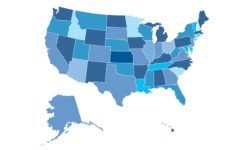Preventing Prescription Drug Diversions at Your Hospital
Healthcare professionals who steal drugs from the hospitals that employ them are a significant and very real threat to patient care. Good inventory management, access control and training will help you put a stop to this type of theft.

 Atlantic Health System’s Manager of Protection and Security Services/Investigations Errol Brudner suggests that a delay or failure in disposing of or returning unused narcotics could also indicate drug diversion. Additionally, employees involved in this kind of theft might replace the stolen drug with another solution.
Atlantic Health System’s Manager of Protection and Security Services/Investigations Errol Brudner suggests that a delay or failure in disposing of or returning unused narcotics could also indicate drug diversion. Additionally, employees involved in this kind of theft might replace the stolen drug with another solution.
“I also think it is important to mention substitution, in which the diverter removes a pain-relieving narcotic from a syringe or IV and replaces it with water or saline,” Brudner says. “This not only denies the patient of their pain relief but is also an infection prevention issue.”
Know What Drugs Are the Most Abused
Robinson also says that knowing what medications are the most abused and where they are in your hospital will help you to better prevent drug
diversion.
“We asked our pharmacy to provide a list of the top abused narcotics — although, in security, we already have a good idea from doing a number of these investigations what those are,” he says. Using the Pandora report, Robinson and his staff can refine the data so they can keep a close eye on the most highly abused drugs and the floors where they are the most available.
Pharmacy is a High Risk Security Area
The Pyxis and MedCarousal dispensing systems at Atlantic Health System and Northwest Hospital are not the only areas where drug diversions may take place. These machines are stocked by the pharmacy, which is a high risk security area that requires constant monitoring.
Atlantic Health System protects its pharmacy with C•CURE card-based access control from Software House, a Tyco International company.
Each time an employee uses his or her card to enter the pharmacy, the system takes a photo. The system also “shows what time the card was used and then we have cameras, both internal and external to the pharmacy, to show who was in there and when — so it’s very tightly controlled,” Robinson explains.
At Northwest Hospital, “access to the pharmacy is controlled by badge swipe access,” Moore says. “Each user in the department has their own sign on into the computer system.”
Training Staff is Crucial
All employees at Northwest Hospital get a security briefing at the new employee orientation, Moore says. “We also work closely with other healthcare security departments through IAHSS to keep abreast of trends.”
Staff at Atlantic Health System is given special security training so they can be on the lookout for suspicious activity on hospital grounds.
“Awareness for the nurse managers and their co-workers is probably the training we spend the most time with,” Robinson says. “We do training for them two or three times a year at all of our hospitals.”
Robinson says nurse managers are instructed to look for trends in their own areas. Additionally, they are encouraged to “look at the Pandora reports and take immediate action.”
Hospital security officers — Atlantic Health System has both uniformed and plainclothes security — are also trained in the Drug Enforcement Administration’s (DEA) protocols for searching patient rooms for drugs. (For more information, see sidebar Preventing Illegal Drug Use By Patients.)
In addition, if a fire alarm is pulled, only one officer will initially report to the scene.
“If someone comes into the hospital to pull the fire alarm just to see how security responds, and if everybody on the shift runs to that fire alarm, that’s a great opportunity for [the suspect] to go into the pharmacy,” Robinson explains.
Hospital, Patient Safety is at Stake
It’s important to be vigilant when searching for indicators of drug diversion, Robinson says.
“You do have an obligation to your patients because an addicted nurse or a physician under the influence — anyone in a patient care role — is a risk first and foremost to the patient,” he says. “They then also become a risk to the hospital and the hospital’s reputation.”
New Jersey’s RAMP program
In 2003, the New Jersey State Nurses Association founded the Recovery and Monitoring Program (RAMP) to encourage health professionals with addictions to seek recovery. Alan Robinson, director of protection and security services for Atlantic Health System, says he refers to the program employees who are caught diverting drugs.
If a nurse is suspected of taking drugs for personal use, “we’re looking to get them help and rehabilitate them,” Robinson says. “We bring the nurse in, talk to them about what we’ve seen, and more often than not — they are usually reluctant, obviously they’re scared— but through [RAMP]…we are going to get them help.”
If you appreciated this article and want to receive more valuable industry content like this, click here to sign up for our FREE digital newsletters!
 Leading in Turbulent Times: Effective Campus Public Safety Leadership for the 21st Century
Leading in Turbulent Times: Effective Campus Public Safety Leadership for the 21st Century
This new webcast will discuss how campus public safety leaders can effectively incorporate Clery Act, Title IX, customer service, “helicopter” parents, emergency notification, town-gown relationships, brand management, Greek Life, student recruitment, faculty, and more into their roles and develop the necessary skills to successfully lead their departments. Register today to attend this free webcast!







